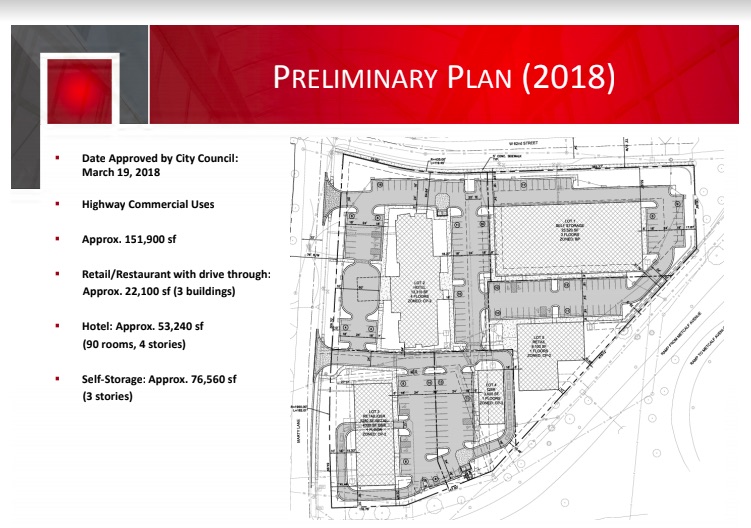A delay may result in the city of Overland Park scrapping the Metcalf Crossing private-public partnership to demolish two old hotels and redevelop on the corner of Metcalf and Shawnee Mission Parkway.
Performance milestones included in an agreement between the city and the developer require that the developer of the property demolish existing, dilapidated hotels on the property by September 30. The developer is seeking the city council’s approval for a 60-day extension, but the Overland Park Finance and Economic Development Committee was reluctant to provide during a September 18 meeting.
“This is the third request for an extension that you guys have requested. Why do we believe there won’t be a fourth?” council president John Thompson asked Korb Maxwell, an attorney for the developer.
Developers and the city of Overland Park first reached an agreement to redevelop the property in March 2018. Under its terms, the developer would demolish abandoned Ramada and Knight’s Inn hotels, replacing them with a new hotel, a self-storage facility, and a restaurant with a drive-through. In return, the city would provide the developer with an 80 percent tax-increment financing, or TIF, worth $2.86 million in incentives, and a community improvement district, which would allow the developer to collect an additional 1 percent sales tax to be used to reimburse the developer for site work.

“We want this building down as much as you do,” Maxwell told the committee. “We want it to be what Overland Park has desired–to have that blight remediated.”
The original contract approved in June 2018 was predicated on the developer closing on the purchase of the property in June. The purchase wasn’t complete until October 2018, Maxwell told the council. That delay added four months to the project timeline. When the developer learned that building a hotel on the property wasn’t an option, that caused a second delay.
The development team approached hotel flagships, like Marriott, Hilton, and Hyatt, and learned that the hotel chains were unwilling to franchise on that site.
One of the performance milestones in the development agreement allowed the city to claw back the amount of TIF incentive available to the developer if a hotel wasn’t built on the property. Without a hotel, the TIF-incentive will dip from almost $3 million in incentive to about $2.75 million.
“We are not asking anyone to restore that haircut,” Maxwell said. “We’re living by the deal. We’re not able to move forward.”
Without a hotel, the developer sought other businesses for the site, remolding the proposal to add an office building and a car wash to replace the hotel. That sparked concern from community members concerned that the city was using incentives to fund the development of a car wash and a self-storage facility.
The incentives won’t be used to construct new buildings. Instead, Maxwell told the committee, the incentive funding will be used for land acquisition and to demolish the 40-year-old hotel structures on the site. According to Maxwell, the incentive agreement wasn’t tenant-driven.
“This was a TIF that was about remediating blight,” Maxwell said. “…This was more about coming forward and looking specifically about remediating a city problem.”
From January 2010 through June 2016, the property yielded the majority of crime and arrest reports within the city of Overland Park. Squatters occupied the vacant hotels, inoperable vehicles were stored on the property and pests were a problem.
Councilmember Dave White said when the council first struck an agreement with the developer, he believed demolition would begin quickly. He visited the site prior to Wednesday’s meeting.
“Some salvage operation is going on,” he reported. But, he said he learned the developer didn’t have the appropriate permits.
“I found some evidence of squatting. The owner has not properly secured it from squatters. It’s a fire hazard sitting as it was today,” White said. “Those are the kinds of things I think we need to take into consideration.”
White wondered whether the developer was waiting to raze the hotels as a negotiation tactic. Without an extension, the city can use the failure to meet the Sept. 30 demolition deadline as a cause for scrapping the development agreement.
The committee didn’t grant the developer the requested extension. However, the committee directed city staff to continue working with the developer on a solution. The city council will consider granting an extension and tweaking the development agreement on October 7.



